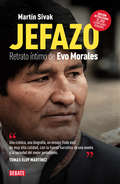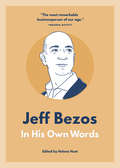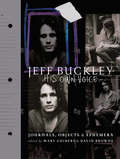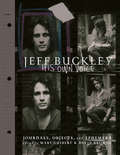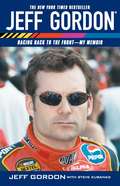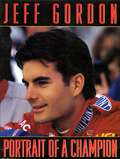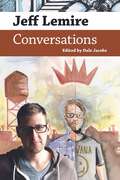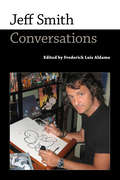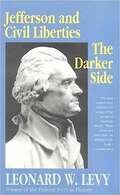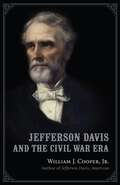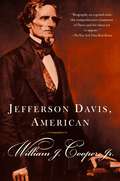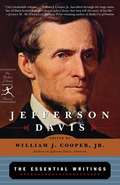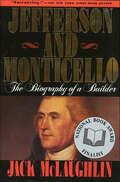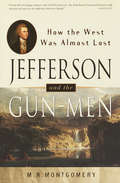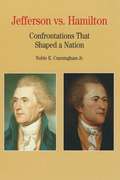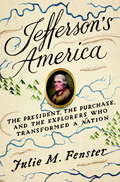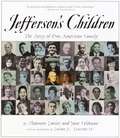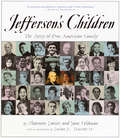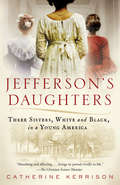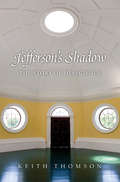- Table View
- List View
Jefazo: Retrato íntimo de Evo Morales
by Martín SivakReedición de la mejor biografía del más sorprendente de los presidenteslatinoamericanos, desde su infancia, sus primeros pasos como dirigentesindical cocalero, hasta sus años como presidente y el modo en que elpoder fue reforzando su carácter y moldeando sus ideas. Aprovechando una relación de más de 10 años con el presidente deBolivia, el autor y periodista que tiene ya otros dos libros sobreBolivia en su haber, logra narrar la vida y la gestión de Evo desdeadentro, contando con su propio testimonio más invalorables fuentes muycercanas a él. Algunas de las preguntas que responde este libro son:¿cómo un pastor de llamas aymará abandona el altiplano para acompañar asu familia en el trópico de Cochabamba y en pocos años se convierte enel líder del poderoso movimiento cocalero? ¿cómo un buscavidas sininstrucción llega a la presidencia con un récord de votos y después seconvierte en nuevo ícono internacional por su condición de indígenaradical? ¿Cómo este hombre, hermano de cuatro niños que murieron porenfermedades curables, ha pasado a integrar, según el gobierno de losEEUU, el nuevo «eje del mal» junto a Fidel Castro y a Hugo Chávez?El libro cuenta un personaje complejo de un país complejo sin ningunaidealización de Morales. Incluye todos sus costados vulnerables ytambién detalles de su vida no pública.
Jeff Bezos
by Chris McNabO HOMEM QUE REVOLUCIONOU O MUNDO DOS NEGÓCIOS Fundador e CEO da Amazon até 2021, Jeff Bezos é amplamente considerado um dos empresários mais bem-sucedidos do mundo, aparecendo nos lugares cimeiros do índice de riqueza da Forbes.Este livro debruça-se sobre as suas primeiras influências, a sua educação, as decisões que tomou na sua impressionante carreira e o modo como construiu e gere o seu império de negócios, que teve início numa startup fundada na sua própria garagem. Atualmente, Jeff Bezos mantém-se como o principal acionista da Amazon, mas os seus interesses viram-se agora para áreas como a filantropia, a educação da geração mais jovem e a exploração do espaço, tendo fundado a empresa de astronáutica Blue Origin e realizado em 2021 a sua primeira expedição ao espaço.
Jeff Bezos: In His Own Words (In Their Own Words)
by Helena HuntOver five hundred quotations from the man Warren Buffett called “the most remarkable businessperson of our age.”Jeff Bezos started Amazon in 1994 as an online bookstore based out of his garage. Since then, the ever-expanding enterprise has revolutionized shopping and, in many important ways, invented e-commerce as we know it. Today, Bezos’s vast empire includes everything from cloud computing and fresh food delivery to movie production and consumer electronics. In recent years, Bezos also has invested in rocket technology, newspaper publishing, and artificial intelligence. Every arm of his business, however, is guided by a fundamental goal: to give customers what they want before they even think to ask for it.Jeff Bezos: In His Own Words offers a unique look into the mind of one of history’s most successful entrepreneurs by collecting more than five hundred of Bezos’s quotes on business, technology, customer service, e-commerce, innovation, entrepreneurship, and more. Meticulously curated from interviews, speeches, shareholder letters, and other sources, this book creates a comprehensive picture of Jeff Bezos, his obsessions, and what makes his ventures thrive.After all these years, Bezos still operates on what he calls “Day One time,” in order to maintain the early experimental spirit of his business. Jeff Bezos: In His Own Words reveals in detail a man who wants to push the future forward—and will inspire readers to do the same.
Jeff Buckley: His Own Voice
by David Browne Mary GuibertThe journals, notebooks, musings, and early song drafts of Jeff Buckley, the late singer best-known for the definitive version of "Hallelujah" and his classic album Grace, including dozens of evocative photos of his personal effects and ephemera.After the release of his acclaimed debut album, Grace, in 1994, Jeff Buckley quickly established himself as one of the decade's most defining talents in pop music: a singer, guitarist, and songwriter with a multi-octave range whose tastes took in rock, blues, jazz, hardcore, Qawwali music, and even show tunes. Hailed by the likes of Bono, Jimmy Page, and Robert Plant, Grace showcased Buckley's voice, passion, and influences and pointed to an inordinately promising future. Three short years later, at the age of thirty, he tragically drowned in Memphis. But his legend and stature have only grown since; in recent years, everyone from Adele to Coldplay to Radiohead has spoken of the impact Buckley's music had on them.For much of his life, Buckley diligently kept journals recording his goals, inspirations, aspirations, and creative struggles. These diaries amount to one of the most insightful life chronicles any musical artist has left behind. Jeff Buckley: His Own Voice marks the first-ever publication of Buckley's handwritten account of his journey from his days in Los Angeles in the late '80s through shortly before his passing. Combined with reproductions of other memorabilia--including letters, notes, and unpublished lyrics--this book takes readers and fans deep into Buckley's mind and life.
Jeff Buckley: The Official Journals, Objects, and Ephemera
by David Browne Mary GuibertPRE ORDER NOW AND BECOME ONE OF THE FIRST TO READ THE OFFICIAL BIOGRAPHY OF THE LATE SINGER JEFF BUCKLEY. INCLUDES NEVER SEEN BEFORE HANDWRITTEN LYRICS, JOURNALS AND DIARIES.In 1994, an artist named Jeff Buckley released 'Grace', his debut album. Hailed immediately by the likes of Bono, Jimmy Page, and Robert Plant, as a singer, guitarist, and writer of a generation.Throughout his life, Buckley obsessively kept journals chronicling his goals, inspirations, aspirations, and creative struggles. His diaries amount to one of the most insightful life chronicles any musical artist has ever left behind. Jeff Buckley: His Own Voice will mark the first-ever publication of Buckley's account of his journey through his handwritten diaries and lyrics. Combined with reproductions of other memorabilia, including letters, notes, and unpublished lyrics - the book will take readers deep inside Buckley's creative mind and personal life. For those who grew up listening to Jeff's music and for those who are just discovering it, Jeff Buckley: His Own Voice will be an intimate portrait of one of the most influential musicians of the 20th century in his own extremely vibrant words and never seen before lyrics.
Jeff Gordon, Racing Back to the Front: My Memoir
by Steve Eubanks Jeff GordonThe New York Times bestselling autobiography of one of auto racing's greatest drivers -- a pedal-to-the-metal look at the life of a NASCAR champion. Jeff Gordon is the hottest thing on the racetrack today! With his skill, determination, and heartfelt love of competitive driving, he has made the Winner's Circle his second home and has helped transform NASCAR racing into the most watched entertainment in America. Here, Jeff Gordon tells the story of his life behind the wheel -- from his unlikely beginnings on the California junior circuit to his meteoric rise to fame. Noting all the roadblocks he faced along the way, Gordon also gives readers an up-close, high-speed look at what it's really like to climb into the cockpit of a stock car every weekend and offers glimpses into the lives and work of his extraordinary crew. This is Jeff Gordon in front of the pack -- an inspirational, thrilling, and true story of courage and character from one of auto racing's greatest heroes.
Jeff Gordon: Portrait of a Champion
by Jeff Gordon"Go out and work hard and just take it one step at a time."He is a living legend, an athlete whodominates his sport as few otherscan. With his rainbow-colored No.24 Dupont Chevrolet Monte Carlo, JeffGordon has accomplished what noman before him could. In 1997, he wonhis second NASCAR Winston CupSeries championship...the Daytona500...the Coca-Cola 600...the Southern500...The Winston ...the Busch Clash.And he became only the second driverto win NASCAR's toughest prize: TheWinston Million.This stunning photographic portrait captures that extraordinary year--from the opening race at Daytona to theAtlanta Motor Speedway where the title became his-- and offers an intimate glimpse of the man behind the wheel himself. You'll discover what he really thinks about life on and off the track including: his familyNASCAR racingthe people who have helped shape his careerhis spiritualityhis fansbeing a role modelthe Rainbow Warriorsand much more.Honest and straightforward, Jeff shares his triumphs and his failures, what it takes to be the best and what the future may hold. Here is a rare look at an amazing champion on the road to glory."Don't ever quit. Don't ever stop fighting. It's not over 'til it's over."
Jeff Lemire: Conversations (Conversations with Comic Artists Series)
by Dale JacobsIn a 2019 interview with the webzine DC in the 80s, Jeff Lemire (b. 1976) discusses the comics he read as a child growing up in Essex County, Ontario—his early exposure to reprints of Silver Age DC material, how influential Crisis on Infinite Earths and DC’s Who’s Who were on him as a developing comics fan, his first reading of Watchmen and The Dark Knight Returns, and his transition to reading the first wave of Vertigo titles when he was sixteen. In other interviews, he describes discovering independent comics when he moved to Toronto, days of browsing comics at the Beguiling, and coming to understand what was possible in the medium of comics, lessons he would take to heart as he began to establish himself as a cartoonist. Many cartoonists deflect from questions about their history with comics and the influences of other artists, while others indulge the interviewer briefly before attempting to steer the questions in another direction. But Lemire, creator of Essex County Trilogy, Sweet Tooth, The Nobody, and Trillium, seems to bask in these discussions. Before he was ever a comics professional, he was a fan. What can be traced in these interviews is the story of the movement from comics fan to comics professional. In the twenty-nine interviews collected in Jeff Lemire: Conversations, readers see Lemire come to understand the process of collaboration, the balancing act involved in working for different kinds of comics publishers like DC and Marvel, the responsibilities involved in representing characters outside his own culture, and the possibilities that exist in the comics medium. We see him embrace a variety of genres, using each of them to explore the issues and themes most important to him. And we see a cartoonist and writer growing in confidence, a working professional coming into his own.
Jeff Smith: Conversations (Conversations with Comic Artists Series)
by Frederick Luis AldamaFirst with his magisterial fantasy Bone to his mind-bending, time-warping sci-fi noir RASL, Paleolithic-set fantasy Tüki: Save the Humans, arthouse-styled superheroic miniseries Shazam!, and his latest children’s book Smiley’s Dream Book, Jeff Smith (b. 1960) has made an indelible mark on the comics industry. As a child, Smith was drawn to Charles Schulz’s Peanuts, Carl Barks’s Donald Duck, and Walt Kelly’s Pogo, and he began the daily practice of drawing his own stories. After writing his regular strip Thorn for The Ohio State University’s student paper, Smith worked in animation before creating, writing, and illustrating his runaway success, Bone. A comedic fantasy epic, Bone focuses on the Bone cousins, white, bald cartoon characters run out of their hometown, lost in a distant, mysterious valley. The self-published series ran from 1991 to 2004 and won numerous awards, including ten Eisner Awards. This career-spanning collection of interviews, ranging from 1999 to 2017, enables readers to follow along with Smith's development as an independent creator, writer, and illustrator.
Jeffanory: Stories from Beyond Soccer Saturday
by Jeff StellingAre you sitting comfortably? Then Jeff will begin ... The universally-loved, award-winning host of Sky Sports' Soccer Saturday and Channel 4's Countdown, and author of the bestselling Jelleyman's Thrown a Wobbly, returns with a Jackanory-style, football-flavoured narrative which gathers together the funniest, weirdest, most tragic, most heart-warming, under-the-radar stories of the football season. The book is stuffed to the gunnels with behind-the-scenes revelations, opinions and personal anecdotes from Jeff, and has a strong leaning towards the absurdities of both the highest levels and the grass-roots of the game. From the Macclesfield goalkeeper booked for using a golf tee to take his goal kicks, to the unintelligible ranting and raving of South American dictator chairmen. Let Jeff be your trusted guide through the madness of the football season, and let Jeffanory supply you with a veritable treasure trove of great anecdotes to take to the pub.
Jeffanory: Stories from Beyond Soccer Saturday
by Jeff StellingAre you sitting comfortably? Then Jeff will begin ... The universally-loved, award-winning host of Sky Sports' Soccer Saturday and Channel 4's Countdown, and author of the bestselling Jelleyman's Thrown a Wobbly, returns with a Jackanory-style, football-flavoured narrative which gathers together the funniest, weirdest, most tragic, most heart-warming, under-the-radar stories of the football season. The book is stuffed to the gunnels with behind-the-scenes revelations, opinions and personal anecdotes from Jeff, and has a strong leaning towards the absurdities of both the highest levels and the grass-roots of the game. From the Macclesfield goalkeeper booked for using a golf tee to take his goal kicks, to the unintelligible ranting and raving of South American dictator chairmen. Let Jeff be your trusted guide through the madness of the football season, and let Jeffanory supply you with a veritable treasure trove of great anecdotes to take to the pub
Jefferson And Civil Liberties: The Darker Side
by Leonard W. LevyIn the most controversial analysis ever written of the apostle of American liberty, the distinguished constitutional historian Leonard W. Levy examines Jefferson's record on civil liberties and finds it strikingly wanting. Clearing away the saintliness that surrounds the hero, Mr. Levy tries to understand why the “unfamiliar” Jefferson supported loyalty oaths; countenanced internment camps for political suspects; drafted a bill of attainder; urged prosecutions for seditious libel; condoned military despotism; used the Army to enforce laws in time of peace; censored reading; chose professors for their political opinions; and endorsed the doctrine that means, however odious, are justified by ends. "Implicitly," Mr. Levy writes, "this book is a study of libertarian leadership in time of power and time of danger...Jefferson should be seen [by his biographers] as a whole man in the perspective of his times, but my task is to determine the validity of his historical reputation as the apostle of liberty." "Blunt words and blunt facts...an indispensable book."―Commentary.
Jefferson Davis and the Civil War Era
by William J. Jr.In his masterpiece, Jefferson Davis, American, William J. Cooper, Jr., crafted a sweeping, definitive biography and established himself as the foremost scholar on the intriguing Confederate president. Cooper narrows his focus considerably in Jefferson Davis and the Civil War Era, training his expert eye specifically on Davis's participation in and influence on events central to the American Civil War. Nine self-contained essays address how Davis reacted to and dealt with a variety of issues that were key to the coming of the war, the war itself, or in memorializing the war, sharply illuminating Davis's role during those turbulent years.Cooper opens with an analysis of Davis as an antebellum politician, challenging the standard view of Davis as either a dogmatic priest of principle or an inept bureaucrat. Next, he looks closely at Davis's complex association with secession, which included, surprisingly, a profound devotion to the Union. Six studies explore Davis and the Confederate experience, with topics including states' rights, the politics of command and strategic decisions, Davis in the role of war leader, the war in the West, and the meaning of the war. The final essay compares and contrasts Davis's first inauguration in Montgomery, Alabama, in 1861 with a little-known dedication of a monument to Confederate soldiers in the same city twenty-five years later. In 1886, Davis -- an old man of seventy-eight and in poor health -- had himself become a living monument, Cooper explains, and was an essential element in the formation of the Lost Cause ideology.Cooper's succinct interpretations provide straightforward, compact, and deceptively deep new approaches to understanding Davis during the most critical time in his life. Certain to stimulate further thought and spark debate, Jefferson Davis and the Civil War Era offers rare insight into one of American history's most complicated and provocative figures.
Jefferson Davis, American (Vintage Civil War Library)
by William J. CooperFrom a distinguished historian of the America South comes this thoroughly human portrait of the complex man at the center of our nation's most epic struggle.Jefferson Davis initially did not wish to leave the Union-as the son of a veteran of the American Revolution and as a soldier and senator, he considered himself a patriot. William J. Cooper shows us how Davis' initial reluctance turned into absolute commitment to the Confederacy. He provides a thorough account of Davis' life, both as the Confederate President and in the years before and after the war. Elegantly written and impeccably researched, Jefferson Davis, American is the definitive examination of one of the most enigmatic figures in our nation's history.From the Trade Paperback edition.
Jefferson Davis: The Essential Writings
by Jefferson Davis William J. CooperJefferson Davis is one of the most complex and controversial figures in American political history (and the man whom Oscar Wilde wanted to meet more than anyone when he made his tour of the United States). Elected president of the Confederacy and later accused of participating in the assassination of Abraham Lincoln, he is a source of ongoing dissension between northerners and southerners. This volume, the first of its kind, is a selected collection of his writings culled in large part from the authoritative Papers of Jefferson Davis, a multivolume edition of his letters and speeches published by the Louisiana State University Press, and includes thirteen documents from manuscript collections and one privately held document that have never before appeared in a modern scholarly edition. From letters as a college student to his sister, to major speeches on the Constitution, slavery, and sectional issues, to his farewell to the U.S. Senate, to his inaugural address as Confederate president, to letters from prison to his wife, these selected pieces present the many faces of the enigmatic Jefferson Davis.As William J. Cooper, Jr., writes in his Introduction, "Davis's notability does not come solely from his crucial role in the Civil War. Born on the Kentucky frontier in the first decade of the nineteenth century, he witnessed and participated in the epochal transformation of the United States from a fledgling country to a strong nation spanning the continent. In his earliest years his father moved farther south and west to Mississippi. As a young army officer just out of West Point, he served on the northwestern and southwestern frontiers in an army whose chief mission was to protect settlers surging westward. Then, in 1846 and 1847, as colonel of the First Mississippi Regiment, he fought in the Mexican War, which resulted in 1848 in the Mexican Cession, a massive addition to the United States of some 500,000 square miles, including California and the modern Southwest. As secretary of war and U.S. senator in the 1850s, he advocated government support for the building of a transcontinental railroad that he believed essential to bind the nation from ocean to ocean."From the Hardcover edition.
Jefferson and Monticello: The Biography of a Builder
by Jack McLaughlinA National Book Award nominee in 1988, Jack McLaughlin's biography tells the life of Thomas Jefferson as seen through the prism of his love affair with Monticello. For over half a century, it was his consuming passion, his most serious amusement. With a sure command of sources and skilled intuitive understanding of Jefferson, McLaughlin crafts and uncommon portrait of builder and building alike. En route he tells us much about life in Virginia; about Monticello's craftsmen and how they worked their materials; about slavery, class, and family; and, above all, about the multiplicity of domestic concerns that preoccupied this complex man. It is an engaging and incisive look at the eighteenth-century mind: systematic, rational, and curious, but also playful, comfort-loving, and amusing. Ultimately, it provides readers with great insight into daily life in Colonial and Federal America.
Jefferson and the Gun-Men
by M. R. MontgomeryIn 1803, Thomas Jefferson made a visionary purchase that opened an American frontier so vast as to defy the imagination -- nearly all the land from the Mississippi to the Rockies. Few know, however, that the intrigue behind the exploration and opening of the Louisiana Territory was almost as vast as the land itself. Even as Meriwether Lewis and William Clark set out on their legendary journey to the Pacific Ocean, other forces were taking the measure of the land with far darker ambitions. Just three ...
Jefferson vs. Hamilton: Confrontations That Shaped A Nation (The Bedford Series In History And Culture)
by Noble E. Cunningham Jr.This documentary study of Thomas Jefferson and Alexander Hamilton focuses on their differing views of society and government in the formative years of the new American nation. Interweaving more than 40 documents into 7 chronological chapters, the text follows the lives and careers of the two men from their youth, through the Revolutionary War, to the death of Hamilton in 1804. In each chapter, generous excerpts from their public papers and private letters reveal the two men’s often divergent views on government and the Constitution, economic and foreign policy, and the military, and illustrate the roles they played in the emergence of political parties. Reading Jefferson’s First Inaugural Address, the Report on Public Credit, the Kentucky Resolutions, and a host of other documents, students can explore firsthand the two men’s philosophies and the impact these had on the emerging nation. Also included are 10 illustrations, a Jefferson/Hamilton chronology, a bibliography, and an index.
Jefferson's America: The President, the Purchase, and the Explorers Who Transformed a Nation
by Julie M. FensterThe surprising story of how Thomas Jefferson commanded an unrivaled age of American exploration--and in presiding over that era of discovery, forged a great nation. At the dawn of the nineteenth century, as Britain, France, Spain, and the United States all jockeyed for control of the vast expanses west of the Mississippi River, the stakes for American expansion were incalculably high. Even after the American purchase of the Louisiana Territory, Spain still coveted that land and was prepared to employ any means to retain it. With war expected at any moment, Jefferson played a game of strategy, putting on the ground the only Americans he could: a cadre of explorers who finally annexed it through courageous investigation. Responsible for orchestrating the American push into the continent was President Thomas Jefferson. He most famously recruited Meriwether Lewis and William Clark, who led the Corps of Discovery to the Pacific, but at the same time there were other teams who did the same work, in places where it was even more crucial. William Dunbar, George Hunter, Thomas Freeman, Peter Custis, and the dauntless Zebulon Pike--all were dispatched on urgent missions to map the frontier and keep up a steady correspondence with Washington about their findings. But they weren't always well-matched--with each other and certainly not with a Spanish army of a thousand soldiers or more. These tensions threatened to undermine Jefferson's goals for the nascent country, leaving the United States in danger of losing its foothold in the West. Deeply researched and inspiringly told, Jefferson's America rediscovers the robust and often harrowing action from these seminal expeditions and illuminates the president's vision for a continental America.
Jefferson's Children: The Story of One American Family
by Jane Feldman Shannon LanierOn October 31, 1998, the Associated Press broke the news of the DNA findings linking Thomas Jefferson to Sally Hemings through the Eston Hemings line. On November 10, on national TV, Oprah united members of the Jefferson family and the descendants of the Eston, Madison, and Woodson lines of the Hemings family--and history was made. On this show, Lucian Truscott IV, a Jefferson descendant, issued an invitation to the Hemings family to come to a family reunion at Monticello. At the reunion, emotions ran high--and it was in this setting that photographer Jane Feldman met Shannon Lanier and the idea for this book was born. The authors have since traveled the country amassing historical materials and interviewing and photographing members of both sides of the family. This is the story of their journey, 200 years back in time, and back and forth across family and racial lines.
Jefferson's Children: The Story of One American Family
by Jane Feldman Shannon LaNierNow available in ebook format--one of the important books that marked the beginning of the ongoing conversation about slavery and our nation's history. From the sixth great-grandson of Thomas Jefferson and enslaved woman Sally Hemmings comes an anthology of Jefferson's living descendants.Told in the style of a family photo album—with a combination of photographs and interviews—Jefferson&’s Children is the riveting story of Thomas Jefferson and Sally Hemming&’s sixth great-grandson, Shannon Lanier&’s, travels across the country to meet his relatives from both sides of the family. The profiles contained chart the multiple perspectives of Jefferson&’s and Hemming&’s descendants, from those who embrace their heritage to those who want nothing to do with Jefferson&’s legacy. A fascinating picture soon emerges, one that begins with a pairing of two individuals with vastly disparate levels of power—on the one side, the third president of the United States and the author of the Declaration of Independence; on the other, the woman who was his property—and that ultimately represents America&’s complicated history with issues of diversity and race and the unusual ways in which we define family.An ALA Best Book for Young Adults &“The portraits that emerge are as generous and jumbled as America itself.&” —The New York Times &“A book about American history, racial identity and the bonds of family that will help young people navigate these difficult areas.&” —Black Issues Book Review
Jefferson's Daughters: Three Sisters, White and Black, in a Young America
by Catherine KerrisonThe remarkable untold story of Thomas Jefferson’s three daughters—two white and free, one black and enslaved—and the divergent paths they forged in a newly independent America Thomas Jefferson had three daughters: Martha and Maria by his wife, Martha Wayles Jefferson, and Harriet by his slave Sally Hemings. In Jefferson’s Daughters, Catherine Kerrison, a scholar of early American and women’s history, recounts the remarkable journey of these three women—and how their struggle to define themselves reflects both the possibilities and the limitations that resulted from the American Revolution. Although the three women shared a father, the similarities end there. Martha and Maria received a fine convent school education while they lived with their father during his diplomatic posting in Paris—a hothouse of intellectual ferment whose celebrated salonnières are vividly brought to life in Kerrison’s narrative. Once they returned home, however, the sisters found their options limited by the laws and customs of early America. Harriet Hemings followed a different path. She escaped slavery—apparently with the assistance of Jefferson himself. Leaving Monticello behind, she boarded a coach and set off for a decidedly uncertain future. For this groundbreaking triple biography, Kerrison has uncovered never-before-published documents written by the Jefferson sisters when they were in their teens, as well as letters written by members of the Jefferson and Hemings families. She has interviewed Hemings family descendants (and, with their cooperation, initiated DNA testing) and searched for descendants of Harriet Hemings. The eventful lives of Thomas Jefferson’s daughters provide a unique vantage point from which to examine the complicated patrimony of the American Revolution itself. The richly interwoven story of these three strong women and their fight to shape their own destinies sheds new light on the ongoing movement toward human rights in America—and on the personal and political legacy of one of our most controversial Founding Fathers.
Jefferson's Poplar Forest: Unearthing a Virginia Plantation
by Barbara J. Heath and Jack GaryThomas Jefferson once called his plantation Poplar Forest, "the most valuable of my possessions." For Jefferson, Poplar Forest was a private retreat for him to escape the hordes of visitors and everyday pressures of his iconic estate, Monticello.Jefferson's Poplar Forest uses the knowledge gained from long-term and interdisciplinary research to explore the experiences of a wide range of people who lived and worked there between the American Revolution and the Civil War. Multiple archaeological digs reveal details about the lives of Jefferson, subsequent owners and their families, and the slaves (and descendants) who labored and toiled at the site. From the plantation house to the weeds in the garden, Barbara Heath, Jack Gary, and numerous contributors examine the landscapes of the property, investigating the relationships between the people, objects, and places of Poplar Forest.As the first book-length study of the archaeology of a president's estate, Jefferson's Poplar Forest offers a compelling and uniquely specific look into the lives of those who called Poplar Forest home.
Jefferson's Shadow
by Keith ThomsonIn the voluminous literature on Thomas Jefferson, little has been written about his passionate interest in science. This new and original study of Jefferson presents him as a consummate intellectual whose view of science was central to both his public and his private life. Keith Thomson reintroduces us in this remarkable book to Jefferson's eighteenth-century world and reveals the extent to which Jefferson used science, thought about it, and contributed to it, becoming in his time a leading American scientific intellectual. With a storyteller's gift, Thomson shows us a new side of Jefferson. He answers an intriguing series of questions—How was Jefferson's view of the sciences reflected in his political philosophy and his vision of America's future? How did science intersect with his religion? Did he make any original contributions to scientific knowledge?—and illuminates the particulars of Jefferson's scientific endeavors. Thomson discusses Jefferson's theories that have withstood the test of time, his interest in the practical applications of science to societal problems, his leadership in the use of scientific methods in agriculture, and his contributions toward launching at least four sciences in America: geography, paleontology, climatology, and scientific archaeology. A set of delightful illustrations, including some of Jefferson's own sketches and inventions, completes this impressively researched book.
